Improve Your Child’s Performance with Primary Science Tuition Singapore
Wiki Article
Discover the Important Advantages of Comprehending Main Science for Young Students
The value of main science education for young learners extends far past simple understanding acquisition; it functions as a basic pillar in creating vital abilities such as essential reasoning, analytic, and creativity. Engaging with clinical principles through inquiry-based and interactive tasks not just grows interest yet likewise lays the groundwork for resistant, certain learners. As we discover these benefits further, it comes to be clear that the implications for future academic and personal development are extensive. What specific strategies can educators use to make best use of these advantages?Enhancing Crucial Thinking Skills
Cultivating vital assuming skills in young students is important for their cognitive growth and future academic success. Crucial reasoning enables children to examine details, evaluate proof, and make informed decisions, which are important abilities in today's information-rich society. By taking part in clinical inquiry, young learners can boost these skills as they check out ideas via observation, experimentation, and reasoning.In key scientific research education and learning, teachers can help with critical reasoning by encouraging students to ask questions, develop theories, and conduct experiments. This hands-on approach permits children to exercise analytic and create sensible thinking skills. When trainees examine the homes of products or the principles of movement, they find out to analyze their findings seriously and draw verdicts based on evidence.
Furthermore, discussions and collective jobs can advertise crucial reasoning by giving possibilities for learners to express their thoughts, obstacle presumptions, and consider diverse point of views. By producing an encouraging environment that values inquiry and representation, instructors can nurture important believing abilities that empower young learners to end up being independent thinkers and long-lasting learners. Ultimately, improving these abilities lays a robust foundation for their future academic undertakings and personal development.
Promoting Interest and Expedition

Primary science education supplies an organized atmosphere where young students can check out different sensations with hands-on experiments and monitorings. By permitting them to interact with materials and take part in inquiry-based discovering, instructors create possibilities for kids to formulate theories, check their ideas, and attract final thoughts. Such experiences nurture a sense of marvel and enjoyment about scientific research.

Building Self-confidence in Trouble Addressing
Structure confidence in problem-solving is a vital part of key scientific research education that equips young learners to approach challenges with resilience and imagination - primary science tuition Singapore. They develop necessary abilities in crucial reasoning and evaluation when children are urged to engage with scientific ideas via hands-on activities and inquiry-based discovering. This process not just improves their understanding of clinical principles but likewise cultivates a sense of ownership over their knowingTo build self-confidence, instructors need to produce a supportive setting where errors are deemed chances for development instead of failures. This encourages trainees to take dangers and check out various solutions to troubles. By providing scaffolding and guidance, instructors can aid students navigate complicated jobs, slowly boosting their freedom in problem-solving scenarios.
In addition, collaborative discovering experiences, such as group jobs or experiments, can better boost students' confidence as they discover to verbalize their ideas and listen to others' perspectives. These communications nurture social skills and reinforce the idea that analytic is frequently a cumulative undertaking. Eventually, growing self-confidence in analytical prepares young learners for future scholastic challenges and outfits them with the devices necessary for lifelong learning.
Urging Creativity and Innovation
In the realm of main scientific research education, urging creative thinking and advancement is crucial for cultivating a vibrant learning atmosphere. By cultivating a culture where young students can discover concepts and experiment easily, teachers aid trainees develop critical believing abilities and an enthusiasm for discovery. Creative thinking in science encourages youngsters to ask questions, design theories, and take part in hands-on activities that stimulate their imagination.Incorporating open-ended projects and inquiry-based understanding into the educational program enables pupils to share check that their special point of views and solutions. For example, when entrusted with addressing a problem associated to their atmosphere, trainees can brainstorm numerous methods, causing inventive results that showcase their creativity. This not only grows their understanding of scientific principles however additionally imparts a sense of possession over their understanding process.
Furthermore, imaginative science education and learning supports collaboration amongst peers, as students frequently share concepts and construct on one another's insights - primary science tuition Singapore. This collaborative spirit promotes not only technology but likewise necessary social skills. Thus, by focusing on imagination and innovation in key science education, we equip young learners to think seriously, accept obstacles, and picture possibilities, laying a solid foundation for long-lasting knowing and expedition
Planning For Future Knowing Difficulties
Young students' capability to browse future learning challenges rests on a solid structure in main scientific research education and learning. This foundational understanding equips students with important assuming abilities and an organized strategy to analytic, vital for taking on intricate concerns in an ever-evolving world. Main scientific research promotes inquiry-based learning, motivating students to ask questions, discover theories, and involve in hands-on experiments.As they establish these abilities, learners come to be skilled at assessing data, acknowledging patterns, and drawing informed verdicts. Such expertises are vital not just in scientific fields yet additionally in design, innovation, and mathematics (STEM), where interdisciplinary knowledge is significantly crucial.
Furthermore, main scientific research education and learning grows a sense of curiosity and durability in young learners, enabling them to view challenges as possibilities for growth. As they go now run into and get rid of obstacles in their clinical explorations, they develop confidence in their ability to adapt and innovate.
Eventually, a solid structure in main science not only prepares young students for academic searches yet likewise equips them with the devices required for long-lasting learning and flexibility in a swiftly transforming international landscape. By purchasing key scientific research education, we are buying the future potential of our students.
Final Thought
Recognizing primary scientific research is important for young students, as it cultivates vital reasoning, curiosity, and creativity. Engaging with clinical concepts with hands-on experiments builds and improves analytic capacities resilience. This fundamental knowledge not just outfits students to examine information and acknowledge patterns but also supports an inquiry-based way of thinking. Inevitably, the benefits of primary scientific research education prepare kids for future scholastic quests and instill long-lasting understanding routines necessary for prospering in an ever-evolving world.The significance of primary science education and learning for young look at here now learners extends far past plain understanding acquisition; it serves as an essential column in developing essential abilities such as critical reasoning, analytic, and imagination. By developing a supportive setting that values inquiry and representation, instructors can nurture important believing skills that empower young learners to become independent thinkers and lifelong students. Therefore, by focusing on creative thinking and advancement in primary science education, we equip young learners to believe critically, welcome difficulties, and picture opportunities, laying a strong foundation for long-lasting understanding and exploration.
Young students' capacity to browse future learning difficulties pivots on a strong foundation in primary scientific research education.Understanding primary science is critical for young learners, as it fosters vital reasoning, interest, and creativity.
Report this wiki page